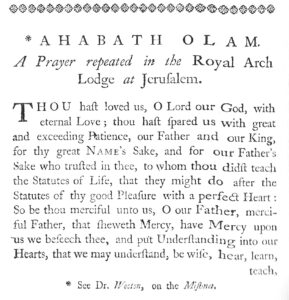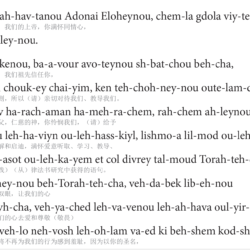| Source (Hebrew) | Translation (English) |
|---|---|
אַהֲבַת עוֹלָם אֲהַבְתָּֽנוּ יְהֹוָה אֱלֹהֵֽינוּ חֶמְלָה גְדוֹלָה וִיתֵרָה חָמַֽלְתָּ עָלֵֽינוּ: אָבִֽינוּ מַלְכֵּֽנוּ בַּעֲבוּר שִׁמְךָ הַגָּדוֹל וּבַעֲבוּר אֲבוֹתֵֽינוּ שֶׁבָּטְחוּ בְךָ וַתְּלַמְּדֵם חֻקֵּי חַיִּים לַעֲשׂוֹת רְצוֹנְךָ בְּלֵבָב שָׁלֵם כֵּן תְּחָנֵּֽנוּ וּתְלַמְּדֵֽנוּ: |
Thou hast loved us, O Lord our God, with eternal Love; thou hast spared us with great and exceeding Patience, our Father and our King, for thy great NAME’s sake, and for our fathers’ sake who trusted in thee, to whom thou didst teach the statutes of Life, that they might do after the statutes of thy good Pleasure with a perfect Heart: |
אָבִֽינוּ אָב הָרַחֲמָן הַמְרַחֵם רַחֵם עָלֵֽינוּ וְתֵן בְּלִבֵּֽנוּ בִּינָה לְהָבִין וּלְהַשְׂכִּיל לִשְׁמֹֽעַ לִלְמוֹד וּלְלַמֵּד לִשְׁמֹר וְלַעֲשׂוֹת וּלְקַיֵּם אֶת כָּל דִּבְרֵי תַּלְמוּד תּוֹרָתֶֽךָ בְּאַהֲבָה: וְהָאֵר עֵינֵֽינוּ בְּתוֹרָתֶֽךָ וְדַבֵּק לִבֵּֽנוּ בְּמִצְוֺתֶֽיךָ וְיַחֵד לְבָבֵֽנוּ לְאַהֲבָה וּלְיִרְאָה אֶת שְׁמֶֽךָ, לְמַֽעַן לֹא נֵבוֹשׁ וְלֹא נִכָּלֵם וְלֹא נִכָּשֵׁל לְעוֹלָם וָעֶד |
so be thou merciful unto us, O our Father, merciful Father, that sheweth Mercy, have Mercy upon us we beseech thee, and put Understanding into our Hearts, that we may understand, be wise, hear, learn, teach, keep, do, and perform all the Words of the Doctrine of thy Law in Love, and enlighten our Eyes in thy Commandments, and cause our Hearts to cleave to thy Law, and unite them in the Love and Fear of thy NAME; we will not be ashamed, nor confounded, nor stumble, for ever and ever. |
כִּי בְשֵׁם קָדְשְׁךָ הַגָּדוֹל הַגִּבּוֹר וְהַנּוֹרָא בָּטָֽחְנוּ נָגִֽילָה וְנִשְׂמְחָה בִּישׁוּעָתֶֽךָ: וְרַחֲמֶֽיךָ יְהֹוָה אֶלֹהֵֽינוּ וַחֲסָדֶֽיךָ הָרַבִּים אַל יַעַזְבֽוּנוּ נֶֽצַח סֶֽלָה וָעֶד׃ מַהֵר וְהָבֵא עָלֵֽינוּ בְּרָכָה וְשָׁלוֹם מְהֵרָה מֵאַרְבַּע כַּנְפוֹת כָּל הָאָֽרֶץ וּשְׁבוֹר עוֹל הַגּוֹיִם מֵעַל צַוָּארֵֽנוּ וְתוֹלִיכֵֽנוּ מְהֵרָה קוֹמְמִיּוּת לְאַרְצֵֽנוּ כִּי אֵל פּוֹעֵל יְשׁוּעוֹת אָֽתָּה וּבָֽנוּ בָחַֽרְתָּ מִכָּל עַם וְלָשׁוֹן וְקֵרַבְתָּֽנוּ מַלְכֵּֽנוּ לְשִׁמְךָ הַגָּדוֹל סֶֽלָה בֶּאֱמֶת בְּאַהֲבָה לְהוֹדוֹת לְךָ וּלְיַחֶדְךָ בְּאַהֲבָה וּלְאַהֲבָה אֶת שְׁמֶֽךָ: בָּרוּךְ אַתָּה יְהֹוָה הַבּוֹחֵר בְּעַמּוֹ יִשְׂרָאֵל בְּאַהֲבָה: |
Because we have trusted in thy Holy, Great, Mighty, and Terrible NAME, we will rejoice and be glad in thy salvation, and in thy Mercies, O Lord our God; and the Multitude of thy Mercies, shall not forsake us for ever. Selah: And now make Haste and bring upon us a Blessing, and Peace from the four Corners of the Earth; break the Yoke of the Gentiles[1] Wotton notes here as follows, “The Jews in our Saviour’s Time were under the Roman Yoke. They were dispersed over the whole Roman Empire, and a great way faster(?) toward the East. Parthians, and Medes, and Elamites, dwellers in Mesopotamia, in Cappadocia, Pontus and Asia, Phrygia, and Pamphylia, in Aegypt, in the Parts of Libya about Cyrene, Roman, Cretes and Arabians, i.e. Jews who inherited in all those Countries, were all met together at the Great Pentecost, when the Holy Ghost fell on the Disciples in the second of the Acts. And there is not on single Syllable in all these Blessings which hints at the Destruction of the Second Temple, or betrays a later Time than that in which our Saviour lived.” from off our Necks, and bring us upright into our Land,[2] These lines omitted from the translation attested in the Ahiman Rezon (1756), p. 46. for thou art a God that workest salvation; and has chosen us out of every People and Language; and thou, our King, hast caused us to cleave to thy Great NAME, in love to praise thee and to be united to thee, and to love thy NAME: Blessed art thou, O Lord God, who hast chosen thy People Israel in Love. |
Ahavat Olam is the liturgical form of the morning prayer containing the birkat ahavah, the blessing preceding the recitation of the Shema. Curiously, the prayer as translated in English is found in the Ahiman Rezon (Laurence Dermott, 1756), pp. 46-47, a Freemason work containing prayers used and recommended for meetings at Masonic Lodges. There, the prayer is preceded by the header, “A Prayer repeated in the Royal Arch Lodge at Jerusalem.” Shawn Eyer explains “this should be understood as a figurative reference and not a direct claim that there was a Masonic lodge in Jerusalem in 1756. Dermott is essentially saying that this would be a prayer used there in theory, and by extension, a prayer especially suitable to any Royal Arch Lodge. It is unknown the extent to which this prayer was used in Masonic Royal Arch meetings, but it is likely that numerous groups of Royal Arch Masons did so.”
As for the source of this prayer in its English translation, this is pointed to in an annotation following the romanized incipit, “AHAḆATH OLAM” — “A note here reads, ‘See Dr. Wooton, on the Mishna.'” Shawn Eyer clarifies, “Wooten is a typographical error. The English prayer is reprinted nearly verbatim from William Wotton, Miscellaneous discourses relating to the traditions and usages of the scribes and pharisees… (London: W. Bowyer, 1718), vol. 1, pp. 180–181.”
Shawn adds, “This material is part of the research of the Masonic Formation Academy. Support the MFA at <https://www.patreon.com/masonic>.”
Source(s)


Notes
| 1 | Wotton notes here as follows, “The Jews in our Saviour’s Time were under the Roman Yoke. They were dispersed over the whole Roman Empire, and a great way faster(?) toward the East. Parthians, and Medes, and Elamites, dwellers in Mesopotamia, in Cappadocia, Pontus and Asia, Phrygia, and Pamphylia, in Aegypt, in the Parts of Libya about Cyrene, Roman, Cretes and Arabians, i.e. Jews who inherited in all those Countries, were all met together at the Great Pentecost, when the Holy Ghost fell on the Disciples in the second of the Acts. And there is not on single Syllable in all these Blessings which hints at the Destruction of the Second Temple, or betrays a later Time than that in which our Saviour lived.” |
|---|---|
| 2 | These lines omitted from the translation attested in the Ahiman Rezon (1756), p. 46. |

“בִּרְכָּת אַהֲבַה | Ahaḇat Olam (for Shaḥarit), translated by William Wotton (1718)” is shared through the Open Siddur Project with a Creative Commons Attribution-ShareAlike 4.0 International copyleft license.










Leave a Reply